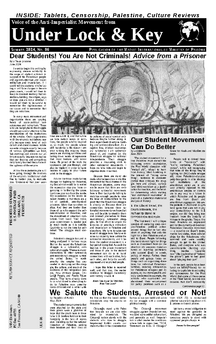
Pro se victory against censorship in Illinois
The Illinois Department of Corrections (IDOC) has the authority
and
obligation to establish rules and regulations to provide
prisoners
with access to published materials including newspapers
and
magazines approved by the Director of the IDOC. (730 ILCS 5/3-
7-1)
The IDOC’s regulations for prisoners’ access to publications is
set
forth in title 20, Sections 525.200 through 525.230 of the
Illinois
Administrative Code (20 Ill. Admn. Code Sec 525.200
through
525.230). A prisoner may subscribe to, solicit free copies
of, or
buy individual copies of approved newspapers, magazines,
books and
other publications for delivery to the facility of
confinement. “A
member of the [prisoner’s] family or a friend may
also order,
solicit or bring approved publications to the
facility.” 20 Ill.
Admn.Code Sec 525.210(c).
The warden of the Pontiac Correctional Center implemented his own
personal policy which prohibited friends and family members of
prisoners from bringing in approved publications.
A complaint for mandamus was filed in the Circuit Court of
Livingston County, Illinois, seeking an order compelling the
warden to allow family members and friends to bring in approved
publications for prisoners in accordance with established
regulations.
The warden filed a motion to dismiss, arguing that the decision to
allow friends and family members to deliver approved publications
to a prisoner is a discretionary act. The warden argued that the
use of the word “may” in the last sentence in Sec 525.210(c)
indicates a discretionary act. Thus, mandamus is inapplicable.
In response to the motion to dismiss, the prisoner argued that the
use of the word “may” does in fact allow for discretion. However,
the plain reading of Sec 525.210(c) clearly indicates that the use
of the word “may” refers to what the prisoner’s family and friends
may do, not to what the IDOC employees may do.
The Circuit Court agreed with the prisoner and denied the warden’s
motion to dismiss. In its holding, the Court ruled that Sec
525.210(c) indicates that discretion lies with the prisoner’s
friends and family members, not the warden. The Court further
ruled that the IDOC must allow prisoners’ friends and family to
bring in approved publications.
The warden subsequently rescinded his policy and permitted friends
and family members to deliver approved publications to prisoners.
[See Markiewicz v. Gilmore , No. 97-MR-22 (Order Filed
July 1, 1998)]
(Note: This action was litigated pro se.)
MIM organizes the Serve the People Prisoners’ Legal Clinic
(PLC). This is a revolutionary program geared toward serving needs
of the oppressed masses as we build opposition to imperialism. PLC
activities vary widely (with room for expansion) and include
fighting censorship, prisoners providing guides on grievance
procedures and the publication of MIM Legal Notes. MIM leads this
program with the knowledge that only armed revolution to seize
state power and establish a dictatorship of the proletariat will
liberate the oppressed. This is one aspect of how we fight
winnable battles to create more maneuverability for political
organizing within the current corrupt system.
MIM Legal Notes is researched and written by comrades behind the
walls. We publish these articles because we believe that the legal
research and information will be useful to other prisoners. But
comrades should be aware that differences in laws between states,
changes in laws and legal precedents over time, and different case
circumstances all mean that even something that was successful for
one person might not work for others. We print the best legal news
and information available to us with the understanding that this
program will only grow stronger with increased exposure and
participation. We encourage prisoners and non-prisoners to
contribute to this program with research and writing.








